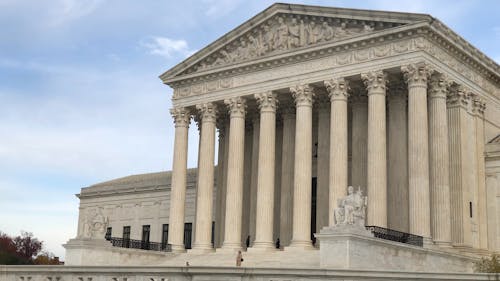EDITORIAL: Student debt relief opens larger conversations about educational, societal equity
As the student debt relief program faces legal pushback, important discussions about the future of higher education must be had

As college students, we know full well how expensive college is. From tuition to housing to food, it costs a lot of money to pursue higher education. Students generally choose to go to college because it is what they believe they must do: go to college, study hard and then find a good job. College is the path to success, and taking loans out is worth it. Or so they said.
In recent years, the cost of attending college has skyrocketed and the return value has plummeted. A 2021 report from Georgetown, for example, found that college costs have risen 169 percent since 1980. The pay for young workers? Up by just 19 percent. The rise in the fees associated with tuition and other expenses simply does not match up with the stunted growth in potential earnings.
These cost increases are driven, at least in part, by the prices associated with college. Food, housing, textbooks: These all make attending college more expensive. To that end, a significant amount of students are forced to work while in college. In fact, close to 70 percent of college students report having jobs while taking classes. Balancing academics and extracurriculars on top of a job is far from an easy feat.
Colleges ought to look into how they can best reduce these extra costs. This can look like expanding meal plans to off-campus eateries or having a cap on the amount of money courses should expect students to spend on textbooks and other materials.
Students go to college, study and work, and they still end up in massive amounts of debt. As earnings have not kept pace with living expenses, individuals will likely have to take out more loans and because they are not earning as much, stay in debt longer. Being in debt for an extended amount of time might mean that students will potentially put off buying a house or starting a family. These side effects of the student debt crisis have profound implications on the national economy.
Thus, when President Joseph R. Biden Jr. announced a student-debt relief program, many individuals were thrilled that something was finally being done to address this enormous problem. The plan would forgive up to $20,000 in student loans, which would be a significant aid for many individuals.
The program has not been without challenges, though. In fact, this past week, the Supreme Court announced that it would hear a case, brought by six attorneys general, over whether Biden has the constitutional to forgive so much debt.
While the constitutionality of the program is litigated, the case does highlight several issues that are pertinent to address. The most blatant problem with the relief is that it feels like a band-aid solution that attempts to correct incredibly complex, multilayered issues with the singular stroke of a pen.
While $20,000 is a significant amount of money, it does not provide nearly enough relief. As stated above, the costs of colleges have grown incredibly while earnings have remained stagnant. A better policy would look at how to best address the rising costs and make it so every individual can pursue higher education without entering into debilitating debt.
Colleges, now, seem to operate as corporations. This operating model harms the entire university population — from students to faculty to every other employee. In a corporate setting, individuals are viewed in terms of what they offer and how much a company can extract from them.
Colleges are not corporations: They are places of learning, where we come together to learn and grow. This mindset must be challenged and changed.
Public universities, like Rutgers, should be engines for social mobility. They should not work on profit-driven analytics, or work on employing management consultants to see how to best cut costs and be as efficient as possible.
One way to go about making this change is for legislative action. Federal and state governments should take steps that are both investigative and proactive. Why is tuition so expensive? Better yet, how can college costs be capped and eventually lowered?
Following reports that the Rutgers football team spent over $450,000 on DoorDash from May 2021 through June 2022, there has been a legislative push in New Jersey to audit and investigate the spending of public institutions of higher education, like Rutgers. Such investigations are important for accountability to ensure money is being properly spent.
These issues also raise important questions about the value of a college degree. If attending university is becoming so expensive and if we cannot trust that our money will not be misused, should students still pursue higher education? Perhaps not. Students are going into deeper debt for longer amounts of time and there are no clear positive outcomes that one might have expected 20 years ago.
To this end, there should be a cultural reset of what success looks like. College should not be viewed as the only way people can succeed or the only marker of intelligence. We should prioritize trade schools and helping individuals discover their talents, and then give all of them the opportunity to put those talents to the best use. As colleges become more expensive and less likely to enable economic success, we need to reframe what it means to be successful.
While Biden's student debt relief is a smart idea, it only begins larger conversations about higher education and our cultural values. We should view the debate over the relief as the beginning of questions related to what we want from society, how to make life more equitable and how to ensure everyone can achieve success.
The Daily Targum's editorials represent the views of the majority of the 154th editorial board. Columns, cartoons and letters do not necessarily reflect the views of the Targum Publishing Company or its staff.



